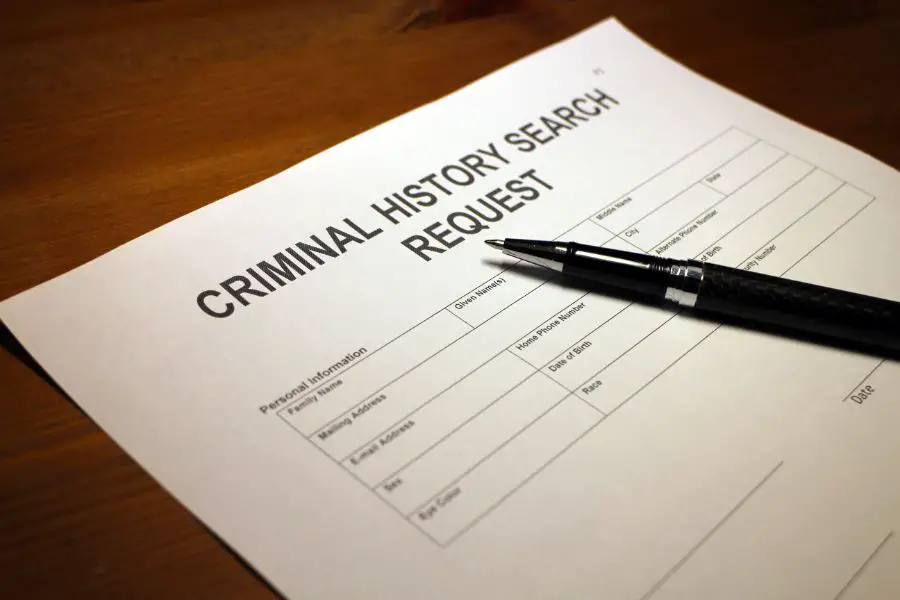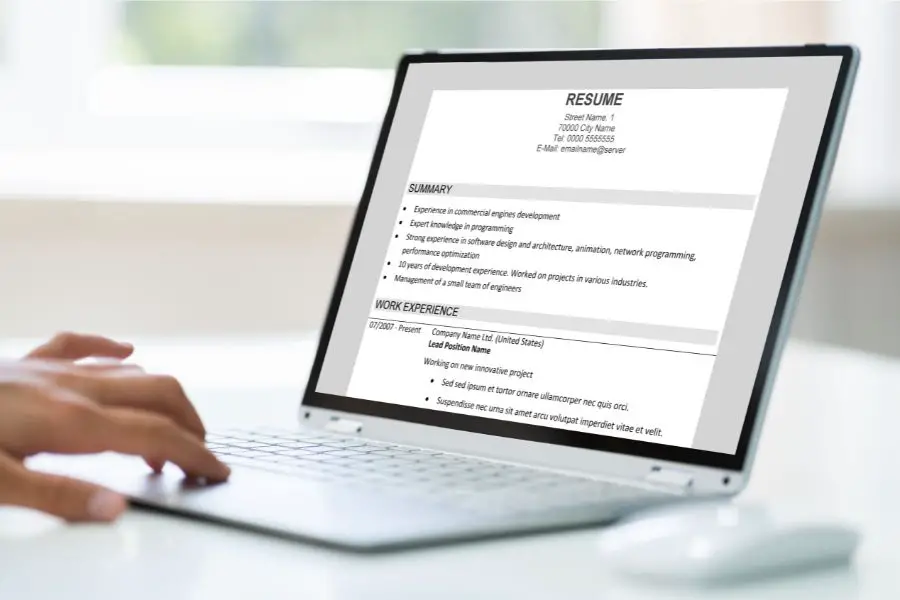Disclaimer: We sometimes use affiliate links in our content. For more information, visit our Disclaimer Page.
Background checks have become an integral part of the hiring process. Many employers utilize these checks to ensure they hire the right candidate. This blog post will discuss what employers look for in a background check, how the process works, and how job seekers can prepare for a background check to improve their chances of getting hired.
Employment Background Check: Why Employers Conduct Them
Employment background checks help employers make informed decisions during the hiring process. By conducting background checks, employers can verify the information provided by job applicants and identify any potential red flags. This can ultimately protect the company from negligent hiring lawsuits and ensure a safe work environment for all employees.
Related: Consequences of Lying on a Resume
What Employers Look for in a Background Check

Employers can access a wide range of information during a background check, depending on the job title and industry. Some of the most common areas of investigation include credit history, employment history, criminal records, and education history. In addition, employers may also review driving records, military records, and social media accounts to better understand the candidate’s character.
Criminal Record Checks
The Significance of Criminal Records
Criminal records are an essential part of a background check for many employers. A criminal history can provide insight into a candidate’s character and potential risks they may pose to the company. Employers may be particularly concerned about criminal records that are directly related to the job’s responsibilities, such as financial crimes for finance-related jobs or driving offenses for positions that require operating a vehicle.
How Criminal Records are Checked
Employers may access criminal records from various sources, including local, state, and federal databases. Arrest records, convictions, and other records related to criminal activity may be reviewed during the background check process. It is important to note that local laws and regulations can dictate what information employers can access and use during the hiring process.
Employment History Verification
Why Employment History Matters
Employment history is a critical aspect of a job application. It demonstrates a candidate’s work experience, job titles, and overall suitability for the position. Employers often review past employment to ensure that the applicant’s work history aligns with the job requirements and to confirm that the candidate has the necessary skills and qualifications.
Employment Verification Process
During the employment verification process, employers typically contact previous employers to confirm job titles, dates of employment, and, in some cases, job performance. This can help employers identify any discrepancies in the information provided by the job candidate and gain insights into the applicant’s work ethic and capabilities.
Credit History Checks
The Role of Credit History in Employment Background Checks
Credit history checks are commonly used by employers, particularly for finance-related jobs or positions that involve handling sensitive personal information. A credit report can provide insight into a candidate’s financial position and overall trustworthiness. Employers may be concerned about hiring someone with a poor credit history, as it could indicate a lack of responsibility or potential risk for theft or fraud.
Fair Credit Reporting Act (FCRA)
The Fair Credit Reporting Act (FCRA) governs the use of credit reports by employers during the hiring process. The FCRA requires employers to obtain written consent from job applicants before accessing their credit reports. Additionally, employers must notify job candidates if their credit history plays a role in an adverse employment decision.
Education History and Verification
Importance of Education History
Education history is another crucial element of the background check process. It helps employers ensure that job applicants have the necessary education and qualifications for the position. Verifying education history can also help employers identify any potential discrepancies in the information provided by the job candidate.
How Education Verification Works
Employers may contact schools or use specialized verification services to confirm the candidate’s academic history during education verification. This process typically involves verifying the candidate’s attendance, graduation dates, and degrees or certifications earned. Some employers may also request transcripts to review the candidate’s coursework and performance.
Driving Record Checks
Why Driving Records Matter
For positions that involve driving or operating a motor vehicle, employers often review driving records as part of the background check process. A driving history can reveal traffic violations, accidents, and license suspensions, which may indicate a candidate’s level of responsibility and suitability for a job that involves driving.
How Driving Records are Checked
Employers can access driving records through motor vehicle record databases. These databases provide information on license status, traffic violations, and other driving-related events. It is essential to note that the specific information available to employers may vary depending on the state’s regulations.
Military Records
Verifying Military Service and Records
For job applicants with military experience, employers may review military records as part of the background check. This can help verify the candidate’s service, rank, and any military-related qualifications or awards. Military records may also provide information on any disciplinary actions or discharges.
Accessing Military Records
Access to military records is generally restricted, and employers must obtain written consent from the job applicant to request information from the appropriate military personnel office. It is important to note that some military records may be exempt from disclosure due to privacy or national security concerns.
Social Media Checks
The Role of Social Media in Background Checks
Social media accounts can provide valuable insights into a candidate’s character, interests, and behavior outside of the workplace. Employers may review social media profiles to assess the candidate’s professionalism, identify any concerning content (e.g., hate speech, harassment, or illegal activities), and verify the information provided during the job search process.
Best Practices for Social Media Checks
Employers should approach social media checks cautiously, as privacy laws and guidelines may apply. It is essential for hiring managers to focus on job-related information and avoid making decisions based on protected characteristics such as race, religion, or sexual orientation. Employers should also consider establishing a clear social media screening policy to ensure consistency and compliance with applicable laws.
Medical Records
Legal and Ethical Considerations
Accessing medical records during the background check process is generally prohibited, as it can infringe on the applicant’s privacy rights and potentially violate doctor-patient confidentiality. Employers should only request medical information when it is directly related to the job’s requirements and when the applicant has provided explicit consent.
Handling Sensitive Personal Information
Employers must handle sensitive personal information with care, ensuring that it is stored securely and only accessed by authorized personnel. Additionally, employers should comply with any applicable privacy laws and regulations and establish clear policies for handling and disposing of sensitive information.
Reference Checks
The Importance of Professional References
Reference checks are a crucial part of the background screening process. They allow employers to gain insights into a candidate’s work ethic, job performance, and interpersonal skills. By speaking with previous employers, supervisors, or colleagues, employers can gather valuable information to help them make informed hiring decisions.
How Reference Checks are Conducted
During a reference check, employers typically contact the professional references provided by the job candidate. Employers may ask about the candidate’s job responsibilities, performance, attitude, and ability to work in a team. It is essential to focus on job-related questions and avoid asking about the candidate’s personal life or protected characteristics.
Related: How To Ask for Feedback After Job Rejection
Preparing for a Background Check

Why Job Seekers Should Prepare for a Background Check
Many job seekers may feel anxious about the background check process. However, being prepared can alleviate stress and help ensure a smoother experience. By understanding what employers look for in a background check and taking proactive steps to address potential issues, job seekers can improve their chances of securing employment.
Reviewing Your Own Records
Before beginning the job search process, job seekers should review their records to ensure accuracy and identify any potential discrepancies. This includes checking credit reports, criminal records, driving records, and employment history. By reviewing these documents, job seekers can address any issues or inaccuracies before they become a problem during the background check process.
Correcting Inaccuracies in Your Records
If a job seeker identifies inaccuracies in their records, it is essential to correct the information. This may involve contacting credit reporting agencies, local law enforcement, or the relevant institutions to request corrections. Job seekers should also gather supporting documentation to verify the correct information and provide it to potential employers if necessary.
Addressing Concerns with Potential Employers
Job seekers should proactively address potential concerns with potential employers during the job search process. If a job seeker has a criminal record, poor credit history, or gaps in employment, it is essential to provide context and explain any mitigating circumstances. Being upfront and honest with potential employers can help build trust and demonstrate accountability.
Ensuring Compliance with Local Laws and Regulations
Understanding the Legal Landscape Employers and job seekers should familiarize themselves with local laws and regulations governing background checks and the hiring process. This includes understanding the Fair Credit Reporting Act (FCRA), local “ban-the-box” legislation, and any other relevant laws or guidelines. Legal counsel can be valuable in navigating the complex legal landscape surrounding background checks.
Adhering to Privacy and Discrimination Laws
Employers must comply with privacy and discrimination laws during the background check process. This includes obtaining consent from job candidates before conducting background checks, notifying candidates of adverse employment decisions related to background check findings, and avoiding discrimination based on protected characteristics.
Related: How To Ask Someone For a Job Opportunity
Conclusion
Background checks are crucial to the hiring process, helping employers make informed decisions about potential employees. By understanding what employers look for in a background check and the various aspects of the process, job seekers can be better prepared and improve their chances of securing employment. Additionally, employers can ensure they make fair and legal hiring decisions by adhering to local laws and regulations governing background checks and the hiring process.





